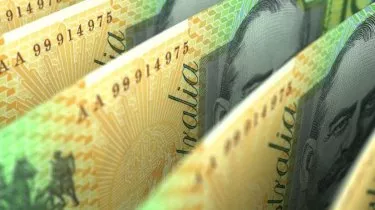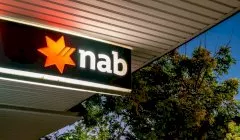Invest
Surprising figures about how much cash Aussies carry
Research from a major bank has revealed how much cash Australians carry in a week, and the figures suggest cash is a long way from being extinct among consumers.
Surprising figures about how much cash Aussies carry
Research from a major bank has revealed how much cash Australians carry in a week, and the figures suggest cash is a long way from being extinct among consumers.

According to new research from NAB, the average Australian still carries about $76 in cash over a period of a week.
Men carry about $84 on average, and women carry $68. Men over the age of 50 carry the most at an average of $99, and women between 18-29 carry the least, at an average of $54.
The data suggests earning capacity doesn’t influence how much cash Australians carry.
“People on incomes under $35,000 a year carry the least, but still around $70. Those on higher incomes above $100,000 carried $76. And, Australians earning between $75,000-100,000 a year carried $86, the most of any income group,” said NAB head of behavioural and industry economics Dean Peterson.

The use of cash is ultimately declining, but NAB’s research suggests cash’s “lure remains strong”.
About three in five respondents said they would choose a cash payment if they were to receive a $1,000 payment.
“Despite young people using cash differently and less often than older Australians, one in two people aged between 18 and 29 still wanted the cash,” said Mr Pearson.
Mostly, Australians carry cash for small transactions and emergencies, according to NAB. Respondents also said they carry cash for speed, convenience and habit.
Carrying cash because some merchants will only accept cash payments is also common. Further, there’s a relationship between when cash is used, and how much a transaction is.
“When spending less than $5, around three in four of us still use cash but this falls to about one in 20 for purchases over $500. When using credit cards, the reverse is true. Only around one in 20 use credit cards for purchases of less than $5, while around one in two when spending over $500,” said Mr Pearson.
Cash crackdown
Regulators like the ATO are cracking down on the cash economy, through their work with what is known as the Black Economy Taskforce.
The taskforce made a range of recommendations to the federal government last year, including reforming the Australian Business Number (ABN) regime and tightening reporting obligations for operators dealing in cash payments.
You can read the full list of recommendations here.

Spending
Household Spending Pops, Rate Hike Looms: A CFO Playbook from an Australian Retail Case
Fresh ABS data shows household outlays running hotter than expected, particularly in services—stoking calls for an RBA move as early as February. For operators, the macro headline is simple; the ...Read more

Spending
State Street economist comments on softer-than-expected CPI data
In light of the latest Consumer Price Index (CPI) data release, Krishna Bhimavarapu, APAC Economist at State Street Investment Management, has provided insight into the implications for the Australian ...Read more

Spending
Moneysmart study reveals Gen Z women more concerned about finances than men
A new research conducted by ASIC’s Moneysmart has unveiled the heightened levels of stress and concern regarding finances and the cost of living among Australian Gen Z women compared to their male ...Read more

Spending
The cost of politeness: Aussies out of pocket by $1,350 due to 'awkward tax'
It's the time of year when Australians dive into their pockets for festive events and gatherings, yet a recent study by PayPal suggests that many are too polite, or perhaps too embarrassed, to ask for ...Read more

Spending
Aussies can ‘NAB Now Pay Later’ with the last major bank to embrace BNPL
NAB has become the latest bank to enter the BNPL market. Read more

Spending
Aussie households spent $368 a week on transport after petrol price surge
Fuel costs have increased by 40 per cent over the past year, a new report from the Australian Automobile Association has revealed. Read more

Spending
Voters say reducing the cost of living should be the government’s top priority
Aussies have ranked high cost of living as the top issue that needs to be addressed by the next government. Read more

Spending
Bodies back Labor’s commitment to stronger BNPL regulation
All parties should commit to stronger regulations for the BNPL sector, according to Financial Counselling Australia. Read more

Spending
Household Spending Pops, Rate Hike Looms: A CFO Playbook from an Australian Retail Case
Fresh ABS data shows household outlays running hotter than expected, particularly in services—stoking calls for an RBA move as early as February. For operators, the macro headline is simple; the ...Read more

Spending
State Street economist comments on softer-than-expected CPI data
In light of the latest Consumer Price Index (CPI) data release, Krishna Bhimavarapu, APAC Economist at State Street Investment Management, has provided insight into the implications for the Australian ...Read more

Spending
Moneysmart study reveals Gen Z women more concerned about finances than men
A new research conducted by ASIC’s Moneysmart has unveiled the heightened levels of stress and concern regarding finances and the cost of living among Australian Gen Z women compared to their male ...Read more

Spending
The cost of politeness: Aussies out of pocket by $1,350 due to 'awkward tax'
It's the time of year when Australians dive into their pockets for festive events and gatherings, yet a recent study by PayPal suggests that many are too polite, or perhaps too embarrassed, to ask for ...Read more

Spending
Aussies can ‘NAB Now Pay Later’ with the last major bank to embrace BNPL
NAB has become the latest bank to enter the BNPL market. Read more

Spending
Aussie households spent $368 a week on transport after petrol price surge
Fuel costs have increased by 40 per cent over the past year, a new report from the Australian Automobile Association has revealed. Read more

Spending
Voters say reducing the cost of living should be the government’s top priority
Aussies have ranked high cost of living as the top issue that needs to be addressed by the next government. Read more

Spending
Bodies back Labor’s commitment to stronger BNPL regulation
All parties should commit to stronger regulations for the BNPL sector, according to Financial Counselling Australia. Read more








